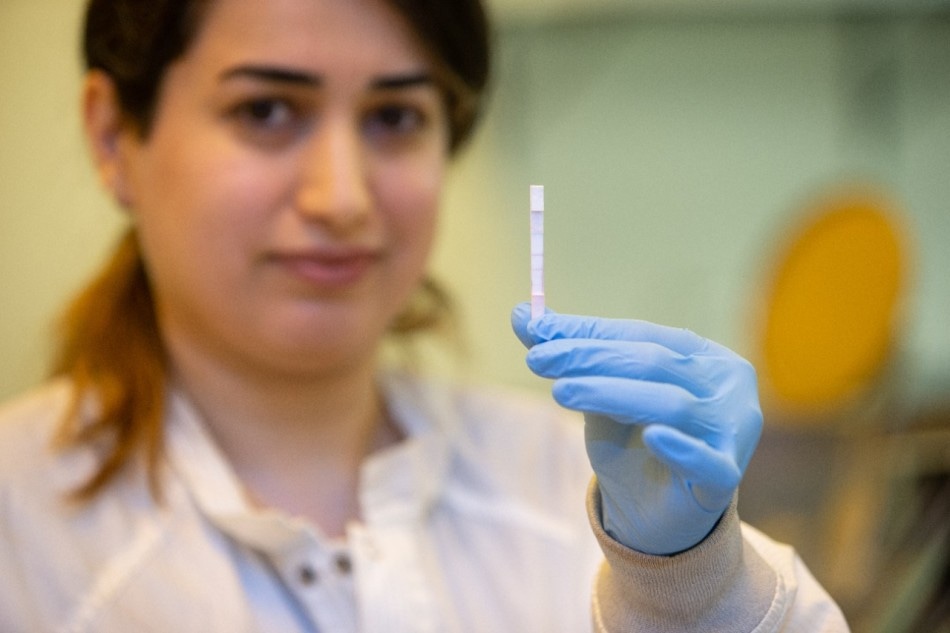May 27 2019
Stress is frequently referred to as “the silent killer” because of its silent and mysterious effects on numerous issues from heart disease to mental health.
 UC research assistant Shima Dalirirad holds up a sensor in UC professor Andrew Steckl's Nanoelectronics Laboratory. Dalirirad conducted a related study on detecting cortisol in sweat that was published this year in the journal "Sensors and Actuators B: Chemistry." (Photo/Andrew Higley/UC Creative Services)
UC research assistant Shima Dalirirad holds up a sensor in UC professor Andrew Steckl's Nanoelectronics Laboratory. Dalirirad conducted a related study on detecting cortisol in sweat that was published this year in the journal "Sensors and Actuators B: Chemistry." (Photo/Andrew Higley/UC Creative Services)
Presently, scientists at the University of Cincinnati (UC) have prepared a new test that can easily and effortlessly measure general stress hormones using sweat, urine, blood, or saliva. Ultimately, they hope to convert their ideas into a basic device that patients can operate at home to track their health.
The results have been reported in the May issue of the journal American Chemical Society Sensors.
I wanted something that’s simple and easy to interpret. This may not give you all the information, but it tells you whether you need a professional who can take over.
Andrew Steckl, Ohio Eminent Scholar and Professor of Electrical Engineering, College of Engineering and Applied Science, UC
The innovation was made possible due to UC's pledge to research as described in its strategic direction named Next Lives Here.
UC scientists built a device that uses UV light to measure stress hormones in a drop of sweat, urine, blood, or saliva. These stress biomarkers are present in all of these fluids, although, in various quantities, Steckl said.
“It measures not just one biomarker but multiple biomarkers. And it can be applied to different bodily fluids. That’s what’s unique,” he said.
Steckl has been investigating biosensors for years in his Nanoelectronics Laboratory. The most recent journal article belongs to a series of research papers his team has written on biosensors, including one that gives a review of approaches for point-of-care diagnostics of stress biomarkers.
Personal experience assisting his father with a health crisis informed his research and opinion that a home test for several health concerns would be extremely helpful.
“I had to take him quite often to the lab or doctor to have tests done to adjust his medication. I thought it would be great if he could just do the tests himself to see if he was in trouble or just imagining things,” Steckl said. “This doesn’t replace laboratory tests, but it could tell patients more or less where they are.”
UC acknowledges grant funding for the project from the National Science Foundation and the U.S. Air Force Research Lab. Steckl said the army researches acute stress in its pilots and others who are pushing the boundaries of human performance.
“Pilots are placed under enormous stress during missions. The ground controller would like to know when the pilot is reaching the end of his or her ability to control the mission properly and pull them out before a catastrophic ending,” Steckl said.
But the UC device has extensive applications, Steckl said. His lab is looking for commercial possibilities.
“You’re not going to replace a full-panel laboratory blood test. That’s not the intent,” Steckl said. “But if you’re able to do the test at home because you’re not feeling well and want to know where you stand, this will tell whether your condition has changed a little or a lot.”
UC graduate Prajokta Ray, the study’s first author, said she was very motivated to work on such a pressing issue for her Ph.D. studies.
“Stress harms us in so many ways. And it sneaks up on you. You don’t know how devastating a short or long duration of stress can be,” Ray said. “So many physical ailments such as diabetes, high blood pressure, and neurological or psychological disorders are attributed to stress the patient has gone through. That’s what interested me.”
Taking exams always gave Ray stress. Understanding how stress impacts a person individually could be very valuable, she said.
“Stress has been a hot topic over the past couple years. Researchers have tried very hard to develop a test that is cheap and easy and effective and detect these hormones in low concentrations,” she said. “This test has the potential to make a strong commercial device. It would be great to see the research go in that direction.”
UC is leading the way in biosensor technology. Its labs are exploring continuous sweat testing and point-of-care diagnostics for numerous issues from traumatic brain injury to lead poisoning.
Steckl, too, has been a distinguished innovator at UC. His papers have been quoted over 13,000 times, according to Google Scholar. In 2016, he used salmon sperm, a common byproduct of the fishing sector, to substitute rare earth metals used in light-emitting diodes for a new type of organic LED.
We’re device engineers at heart. We don’t shy away from things we don’t know much about to begin with. We look for opportunities. That’s a hallmark of electrical engineers. We’re not smart enough not to go where we shouldn’t. Sometimes that pays off!
Andrew Steckl, Ohio Eminent Scholar and Professor of Electrical Engineering, College of Engineering and Applied Science, UC